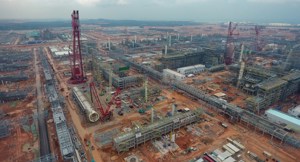Petronas, Aramco to finalize RAPID deal after resolving 'technical issues'
KUALA LUMPUR (Reuters) — Malaysian state energy company Petronas and Aramco are facing "technical issues" in finalizing the Saudi oil major's $7 B investment in a refinery project, but the deal will be completed soon, state news agency Bernama reported on Friday.
The government "is giving room to Petronas and Saudi Aramco to resolve several technical issues related to the investment agreement," Bernama reported, citing Abdul Rahman Dahlan, a minister in the Malaysian prime minister's office.
Saudi Aramco agreed in February, during Saudi King Salman's visit to Malaysia, to buy a $7 B stake in the Refinery and Petrochemical Integrated Development (RAPID) project in the southern state of Johor.
"At the moment, there are certain terms that must be fulfilled by both parties and it's an ongoing process. I expect it won't be long for (Aramco) to release the funds for the project," Abdul Rahman said in an interview with Bernama.
He said there were "no major problems" and that the investment will be made "soon."
Petronas declined to comment. Aramco was not immediately available for comment.
The minister did not say what the "technical issues" were, but recent moves by Petronas and Aramco seem to indicate the project is moving along.
Last month, Aramco agreed to take a $900 MM stake in petrochemical projects in the RAPID complex, expanding the agreement signed in February.
The companies are also jointly seeking to raise $8 B via a bridge loan for the RAPID project, Project Finance International, owned by Thomson Reuters, reported last week.
Petronas had said in February, when it signed the agreement with Aramco, that the deal could take up to a year to close.
RAPID is a $27 B project located between the Malacca Strait and the South China Sea, conduits for Middle East oil and gas bound for China, Japan and South Korea.
It will contain a 300,000-bpd oil refinery and a petrochemical complex with a capacity of 7.7 MMmtpy. Refinery operations are set to begin in 2019, with petrochemical operations to follow 6–12 months afterwards.
Reporting by A. Ananthalakshmi and Rozanna Latiff; Editing by Tom Hogue







Comments